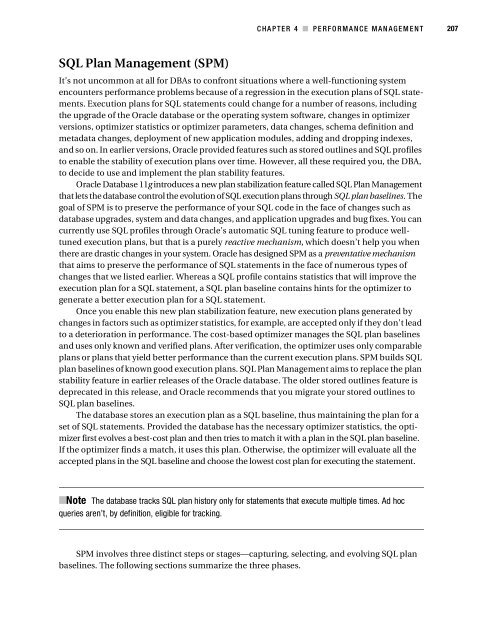- Page 1:
The EXPERT’s VOIce ® IN ORACLEAl
- Page 7:
Contents at a GlanceAbout the Autho
- Page 11 and 12:
■CONTENTSixSQL*Plus New Features
- Page 13 and 14:
■CONTENTSxiEnterprise Manager Int
- Page 15 and 16:
■CONTENTSxiiiCombined Capture and
- Page 17:
■CONTENTSxvImprovements in Redo T
- Page 21:
About the Authors■SAM ALAPATI is
- Page 24 and 25:
xxii■ACKNOWLEDGMENTSNothing I do
- Page 26 and 27:
xxiv■INTRODUCTIONPerformance Mana
- Page 28 and 29:
xxvi■INTRODUCTION• The easy add
- Page 30 and 31:
xxviii■INTRODUCTION• The flashb
- Page 32 and 33:
2 CHAPTER 1 ■ INSTALLING, UPGRADI
- Page 34 and 35:
4 CHAPTER 1 ■ INSTALLING, UPGRADI
- Page 36 and 37:
6 CHAPTER 1 ■ INSTALLING, UPGRADI
- Page 38 and 39:
8 CHAPTER 1 ■ INSTALLING, UPGRADI
- Page 40 and 41:
10 CHAPTER 1 ■ INSTALLING, UPGRAD
- Page 42 and 43:
12 CHAPTER 1 ■ INSTALLING, UPGRAD
- Page 44 and 45:
14 CHAPTER 1 ■ INSTALLING, UPGRAD
- Page 46 and 47:
16 CHAPTER 1 ■ INSTALLING, UPGRAD
- Page 48 and 49:
18 CHAPTER 1 ■ INSTALLING, UPGRAD
- Page 50 and 51:
20 CHAPTER 1 ■ INSTALLING, UPGRAD
- Page 52 and 53:
22 CHAPTER 1 ■ INSTALLING, UPGRAD
- Page 54 and 55:
24 CHAPTER 1 ■ INSTALLING, UPGRAD
- Page 56 and 57:
26 CHAPTER 1 ■ INSTALLING, UPGRAD
- Page 58 and 59:
28 CHAPTER 1 ■ INSTALLING, UPGRAD
- Page 60 and 61:
30 CHAPTER 1 ■ INSTALLING, UPGRAD
- Page 62 and 63:
32 CHAPTER 1 ■ INSTALLING, UPGRAD
- Page 64 and 65:
34 CHAPTER 1 ■ INSTALLING, UPGRAD
- Page 66 and 67:
36 CHAPTER 1 ■ INSTALLING, UPGRAD
- Page 68 and 69:
38 CHAPTER 1 ■ INSTALLING, UPGRAD
- Page 70 and 71:
40 CHAPTER 1 ■ INSTALLING, UPGRAD
- Page 72 and 73:
42 CHAPTER 1 ■ INSTALLING, UPGRAD
- Page 74 and 75:
44 CHAPTER 1 ■ INSTALLING, UPGRAD
- Page 76 and 77:
46 CHAPTER 1 ■ INSTALLING, UPGRAD
- Page 78 and 79:
48 CHAPTER 1 ■ INSTALLING, UPGRAD
- Page 80 and 81:
50 CHAPTER 1 ■ INSTALLING, UPGRAD
- Page 82 and 83:
52 CHAPTER 1 ■ INSTALLING, UPGRAD
- Page 84 and 85:
54 CHAPTER 1 ■ INSTALLING, UPGRAD
- Page 86 and 87:
56 CHAPTER 1 ■ INSTALLING, UPGRAD
- Page 88 and 89:
58 CHAPTER 2 ■ DATABASE DIAGNOSAB
- Page 90 and 91:
60 CHAPTER 2 ■ DATABASE DIAGNOSAB
- Page 92 and 93:
62 CHAPTER 2 ■ DATABASE DIAGNOSAB
- Page 94 and 95:
64 CHAPTER 2 ■ DATABASE DIAGNOSAB
- Page 96 and 97:
66 CHAPTER 2 ■ DATABASE DIAGNOSAB
- Page 98 and 99:
68 CHAPTER 2 ■ DATABASE DIAGNOSAB
- Page 100 and 101:
70 CHAPTER 2 ■ DATABASE DIAGNOSAB
- Page 102 and 103:
72 CHAPTER 2 ■ DATABASE DIAGNOSAB
- Page 104 and 105:
74 CHAPTER 2 ■ DATABASE DIAGNOSAB
- Page 106 and 107:
76 CHAPTER 2 ■ DATABASE DIAGNOSAB
- Page 108 and 109:
78 CHAPTER 2 ■ DATABASE DIAGNOSAB
- Page 110 and 111:
80 CHAPTER 2 ■ DATABASE DIAGNOSAB
- Page 112 and 113:
82 CHAPTER 2 ■ DATABASE DIAGNOSAB
- Page 114 and 115:
84 CHAPTER 2 ■ DATABASE DIAGNOSAB
- Page 116 and 117:
86 CHAPTER 2 ■ DATABASE DIAGNOSAB
- Page 118 and 119:
88 CHAPTER 2 ■ DATABASE DIAGNOSAB
- Page 120 and 121:
90 CHAPTER 2 ■ DATABASE DIAGNOSAB
- Page 122 and 123:
92 CHAPTER 2 ■ DATABASE DIAGNOSAB
- Page 124 and 125:
94 CHAPTER 2 ■ DATABASE DIAGNOSAB
- Page 126 and 127:
96 CHAPTER 2 ■ DATABASE DIAGNOSAB
- Page 128 and 129:
98 CHAPTER 2 ■ DATABASE DIAGNOSAB
- Page 130 and 131:
100 CHAPTER 3 ■ DATABASE ADMINIST
- Page 132 and 133:
102 CHAPTER 3 ■ DATABASE ADMINIST
- Page 134 and 135:
104 CHAPTER 3 ■ DATABASE ADMINIST
- Page 136 and 137:
106 CHAPTER 3 ■ DATABASE ADMINIST
- Page 138 and 139:
108 CHAPTER 3 ■ DATABASE ADMINIST
- Page 140 and 141:
110 CHAPTER 3 ■ DATABASE ADMINIST
- Page 142 and 143:
112 CHAPTER 3 ■ DATABASE ADMINIST
- Page 144 and 145:
114 CHAPTER 3 ■ DATABASE ADMINIST
- Page 146 and 147:
116 CHAPTER 3 ■ DATABASE ADMINIST
- Page 148 and 149:
118 CHAPTER 3 ■ DATABASE ADMINIST
- Page 150 and 151:
120 CHAPTER 3 ■ DATABASE ADMINIST
- Page 152 and 153:
122 CHAPTER 3 ■ DATABASE ADMINIST
- Page 154 and 155:
124 CHAPTER 3 ■ DATABASE ADMINIST
- Page 156 and 157:
126 CHAPTER 3 ■ DATABASE ADMINIST
- Page 158 and 159:
128 CHAPTER 3 ■ DATABASE ADMINIST
- Page 160 and 161:
130 CHAPTER 3 ■ DATABASE ADMINIST
- Page 162 and 163:
132 CHAPTER 3 ■ DATABASE ADMINIST
- Page 164 and 165:
134 CHAPTER 3 ■ DATABASE ADMINIST
- Page 166 and 167:
136 CHAPTER 3 ■ DATABASE ADMINIST
- Page 168 and 169:
138 CHAPTER 3 ■ DATABASE ADMINIST
- Page 170 and 171:
140 CHAPTER 3 ■ DATABASE ADMINIST
- Page 172 and 173:
142 CHAPTER 3 ■ DATABASE ADMINIST
- Page 174 and 175:
144 CHAPTER 3 ■ DATABASE ADMINIST
- Page 176 and 177:
146 CHAPTER 3 ■ DATABASE ADMINIST
- Page 178 and 179:
148 CHAPTER 3 ■ DATABASE ADMINIST
- Page 180 and 181:
150 CHAPTER 3 ■ DATABASE ADMINIST
- Page 182 and 183:
152 CHAPTER 3 ■ DATABASE ADMINIST
- Page 184 and 185:
154 CHAPTER 3 ■ DATABASE ADMINIST
- Page 186 and 187: 156 CHAPTER 3 ■ DATABASE ADMINIST
- Page 188 and 189: 158 CHAPTER 3 ■ DATABASE ADMINIST
- Page 190 and 191: 160 CHAPTER 3 ■ DATABASE ADMINIST
- Page 192 and 193: 162 CHAPTER 3 ■ DATABASE ADMINIST
- Page 194 and 195: 164 CHAPTER 3 ■ DATABASE ADMINIST
- Page 196 and 197: 166 CHAPTER 3 ■ DATABASE ADMINIST
- Page 198 and 199: 168 CHAPTER 4 ■ PERFORMANCE MANAG
- Page 200 and 201: 170 CHAPTER 4 ■ PERFORMANCE MANAG
- Page 202 and 203: 172 CHAPTER 4 ■ PERFORMANCE MANAG
- Page 204 and 205: 174 CHAPTER 4 ■ PERFORMANCE MANAG
- Page 206 and 207: 176 CHAPTER 4 ■ PERFORMANCE MANAG
- Page 208 and 209: 178 CHAPTER 4 ■ PERFORMANCE MANAG
- Page 210 and 211: 180 CHAPTER 4 ■ PERFORMANCE MANAG
- Page 212 and 213: 182 CHAPTER 4 ■ PERFORMANCE MANAG
- Page 214 and 215: 184 CHAPTER 4 ■ PERFORMANCE MANAG
- Page 216 and 217: 186 CHAPTER 4 ■ PERFORMANCE MANAG
- Page 218 and 219: 188 CHAPTER 4 ■ PERFORMANCE MANAG
- Page 220 and 221: 190 CHAPTER 4 ■ PERFORMANCE MANAG
- Page 222 and 223: 192 CHAPTER 4 ■ PERFORMANCE MANAG
- Page 224 and 225: 194 CHAPTER 4 ■ PERFORMANCE MANAG
- Page 226 and 227: 196 CHAPTER 4 ■ PERFORMANCE MANAG
- Page 228 and 229: 198 CHAPTER 4 ■ PERFORMANCE MANAG
- Page 230 and 231: 200 CHAPTER 4 ■ PERFORMANCE MANAG
- Page 232 and 233: 202 CHAPTER 4 ■ PERFORMANCE MANAG
- Page 234 and 235: 204 CHAPTER 4 ■ PERFORMANCE MANAG
- Page 238 and 239: 208 CHAPTER 4 ■ PERFORMANCE MANAG
- Page 240 and 241: 210 CHAPTER 4 ■ PERFORMANCE MANAG
- Page 242 and 243: 212 CHAPTER 4 ■ PERFORMANCE MANAG
- Page 244 and 245: 214 CHAPTER 4 ■ PERFORMANCE MANAG
- Page 246 and 247: 216 CHAPTER 4 ■ PERFORMANCE MANAG
- Page 248 and 249: 218 CHAPTER 4 ■ PERFORMANCE MANAG
- Page 250 and 251: 220 CHAPTER 4 ■ PERFORMANCE MANAG
- Page 252 and 253: 222 CHAPTER 4 ■ PERFORMANCE MANAG
- Page 254 and 255: 224 CHAPTER 4 ■ PERFORMANCE MANAG
- Page 256 and 257: 226 CHAPTER 5 ■ DATABASE SECURITY
- Page 258 and 259: 228 CHAPTER 5 ■ DATABASE SECURITY
- Page 260 and 261: 230 CHAPTER 5 ■ DATABASE SECURITY
- Page 262 and 263: 232 CHAPTER 5 ■ DATABASE SECURITY
- Page 264 and 265: 234 CHAPTER 5 ■ DATABASE SECURITY
- Page 266 and 267: 236 CHAPTER 5 ■ DATABASE SECURITY
- Page 268 and 269: 238 CHAPTER 5 ■ DATABASE SECURITY
- Page 270 and 271: 240 CHAPTER 5 ■ DATABASE SECURITY
- Page 272 and 273: 242 CHAPTER 5 ■ DATABASE SECURITY
- Page 274 and 275: 244 CHAPTER 5 ■ DATABASE SECURITY
- Page 276 and 277: 246 CHAPTER 5 ■ DATABASE SECURITY
- Page 278 and 279: 248 CHAPTER 5 ■ DATABASE SECURITY
- Page 280 and 281: 250 CHAPTER 5 ■ DATABASE SECURITY
- Page 282 and 283: 252 CHAPTER 5 ■ DATABASE SECURITY
- Page 284 and 285: 254 CHAPTER 5 ■ DATABASE SECURITY
- Page 286 and 287:
256 CHAPTER 5 ■ DATABASE SECURITY
- Page 288 and 289:
258 CHAPTER 5 ■ DATABASE SECURITY
- Page 290 and 291:
260 CHAPTER 5 ■ DATABASE SECURITY
- Page 292 and 293:
262 CHAPTER 5 ■ DATABASE SECURITY
- Page 294 and 295:
264 CHAPTER 5 ■ DATABASE SECURITY
- Page 296 and 297:
266 CHAPTER 6 ■ BACKUP AND RECOVE
- Page 298 and 299:
268 CHAPTER 6 ■ BACKUP AND RECOVE
- Page 300 and 301:
270 CHAPTER 6 ■ BACKUP AND RECOVE
- Page 302 and 303:
272 CHAPTER 6 ■ BACKUP AND RECOVE
- Page 304 and 305:
274 CHAPTER 6 ■ BACKUP AND RECOVE
- Page 306 and 307:
276 CHAPTER 6 ■ BACKUP AND RECOVE
- Page 308 and 309:
278 CHAPTER 6 ■ BACKUP AND RECOVE
- Page 310 and 311:
280 CHAPTER 6 ■ BACKUP AND RECOVE
- Page 312 and 313:
282 CHAPTER 6 ■ BACKUP AND RECOVE
- Page 314 and 315:
284 CHAPTER 6 ■ BACKUP AND RECOVE
- Page 316 and 317:
286 CHAPTER 6 ■ BACKUP AND RECOVE
- Page 318 and 319:
288 CHAPTER 6 ■ BACKUP AND RECOVE
- Page 320 and 321:
290 CHAPTER 6 ■ BACKUP AND RECOVE
- Page 322 and 323:
292 CHAPTER 6 ■ BACKUP AND RECOVE
- Page 324 and 325:
294 CHAPTER 6 ■ BACKUP AND RECOVE
- Page 326 and 327:
296 CHAPTER 6 ■ BACKUP AND RECOVE
- Page 328 and 329:
298 CHAPTER 6 ■ BACKUP AND RECOVE
- Page 330 and 331:
300 CHAPTER 6 ■ BACKUP AND RECOVE
- Page 332 and 333:
302 CHAPTER 6 ■ BACKUP AND RECOVE
- Page 334 and 335:
304 CHAPTER 6 ■ BACKUP AND RECOVE
- Page 336 and 337:
306 CHAPTER 6 ■ BACKUP AND RECOVE
- Page 338 and 339:
308 CHAPTER 6 ■ BACKUP AND RECOVE
- Page 340 and 341:
310 CHAPTER 6 ■ BACKUP AND RECOVE
- Page 343 and 344:
CHAPTER 7■ ■ ■Data PumpDBAs a
- Page 345 and 346:
CHAPTER 7 ■ DATA PUMP 315if test
- Page 347 and 348:
CHAPTER 7 ■ DATA PUMP 317DBA11g1
- Page 349 and 350:
CHAPTER 7 ■ DATA PUMP 319Encrypti
- Page 351 and 352:
CHAPTER 7 ■ DATA PUMP 321Please b
- Page 353 and 354:
CHAPTER 7 ■ DATA PUMP 323Remappin
- Page 355 and 356:
CHAPTER 7 ■ DATA PUMP 325SELECT d
- Page 357 and 358:
CHAPTER 7 ■ DATA PUMP 327Document
- Page 359 and 360:
CHAPTER 7 ■ DATA PUMP 329SQL> sel
- Page 361 and 362:
CHAPTER 7 ■ DATA PUMP 331SQL> sel
- Page 363 and 364:
CHAPTER 7 ■ DATA PUMP 333DBMS_OUT
- Page 365:
CHAPTER 7 ■ DATA PUMP 335If you a
- Page 368 and 369:
338 CHAPTER 8 ■ ORACLE STREAMSLat
- Page 370 and 371:
340 CHAPTER 8 ■ ORACLE STREAMSA s
- Page 372 and 373:
342 CHAPTER 8 ■ ORACLE STREAMSSQL
- Page 374 and 375:
344 CHAPTER 8 ■ ORACLE STREAMSThe
- Page 376 and 377:
346 CHAPTER 8 ■ ORACLE STREAMSStr
- Page 378 and 379:
348 CHAPTER 8 ■ ORACLE STREAMSDBM
- Page 380 and 381:
350 CHAPTER 8 ■ ORACLE STREAMSPle
- Page 382 and 383:
352 CHAPTER 8 ■ ORACLE STREAMSa p
- Page 384 and 385:
354 CHAPTER 8 ■ ORACLE STREAMSSpl
- Page 386 and 387:
356 CHAPTER 8 ■ ORACLE STREAMSpro
- Page 388 and 389:
358 CHAPTER 8 ■ ORACLE STREAMSSup
- Page 391 and 392:
CHAPTER 9■ ■ ■Storage Managem
- Page 393 and 394:
CHAPTER 9 ■ STORAGE MANAGEMENT 36
- Page 395 and 396:
CHAPTER 9 ■ STORAGE MANAGEMENT 36
- Page 397 and 398:
CHAPTER 9 ■ STORAGE MANAGEMENT 36
- Page 399 and 400:
CHAPTER 9 ■ STORAGE MANAGEMENT 36
- Page 401 and 402:
CHAPTER 9 ■ STORAGE MANAGEMENT 37
- Page 403 and 404:
CHAPTER 9 ■ STORAGE MANAGEMENT 37
- Page 405 and 406:
CHAPTER 9 ■ STORAGE MANAGEMENT 37
- Page 407 and 408:
CHAPTER 9 ■ STORAGE MANAGEMENT 37
- Page 409 and 410:
CHAPTER 9 ■ STORAGE MANAGEMENT 37
- Page 411 and 412:
CHAPTER 9 ■ STORAGE MANAGEMENT 38
- Page 413 and 414:
CHAPTER 9 ■ STORAGE MANAGEMENT 38
- Page 415 and 416:
CHAPTER 9 ■ STORAGE MANAGEMENT 38
- Page 417 and 418:
CHAPTER 9 ■ STORAGE MANAGEMENT 38
- Page 419 and 420:
CHAPTER 9 ■ STORAGE MANAGEMENT 38
- Page 421 and 422:
CHAPTER 9 ■ STORAGE MANAGEMENT 39
- Page 423 and 424:
CHAPTER 9 ■ STORAGE MANAGEMENT 39
- Page 425 and 426:
CHAPTER 9 ■ STORAGE MANAGEMENT 39
- Page 427 and 428:
CHAPTER 9 ■ STORAGE MANAGEMENT 39
- Page 429 and 430:
CHAPTER 9 ■ STORAGE MANAGEMENT 39
- Page 431 and 432:
CHAPTER 9 ■ STORAGE MANAGEMENT 40
- Page 433 and 434:
CHAPTER 9 ■ STORAGE MANAGEMENT 40
- Page 435 and 436:
CHAPTER 9 ■ STORAGE MANAGEMENT 40
- Page 437 and 438:
CHAPTER 9 ■ STORAGE MANAGEMENT 40
- Page 439 and 440:
CHAPTER 9 ■ STORAGE MANAGEMENT 40
- Page 441 and 442:
CHAPTER 9 ■ STORAGE MANAGEMENT 41
- Page 443:
CHAPTER 9 ■ STORAGE MANAGEMENT 41
- Page 446 and 447:
416 CHAPTER 10 ■ DATA GUARD• Lo
- Page 448 and 449:
418 CHAPTER 10 ■ DATA GUARDsql ch
- Page 450 and 451:
420 CHAPTER 10 ■ DATA GUARDDBA11g
- Page 452 and 453:
422 CHAPTER 10 ■ DATA GUARDWhile
- Page 454 and 455:
424 CHAPTER 10 ■ DATA GUARDSQL> c
- Page 456 and 457:
426 CHAPTER 10 ■ DATA GUARDSQL> a
- Page 458 and 459:
428 CHAPTER 10 ■ DATA GUARD7. Swi
- Page 460 and 461:
430 CHAPTER 10 ■ DATA GUARDwho ha
- Page 462 and 463:
432 CHAPTER 10 ■ DATA GUARDSQL> s
- Page 464 and 465:
434 CHAPTER 10 ■ DATA GUARDDynami
- Page 466 and 467:
436 CHAPTER 10 ■ DATA GUARDSQL> B
- Page 468 and 469:
438 CHAPTER 10 ■ DATA GUARDcomman
- Page 470 and 471:
440 CHAPTER 10 ■ DATA GUARDCustom
- Page 472 and 473:
442 CHAPTER 10 ■ DATA GUARDselect
- Page 474 and 475:
444 CHAPTER 10 ■ DATA GUARDby Dat
- Page 476 and 477:
446 CHAPTER 11 ■ APPLICATION DEVE
- Page 478 and 479:
448 CHAPTER 11 ■ APPLICATION DEVE
- Page 480 and 481:
450 CHAPTER 11 ■ APPLICATION DEVE
- Page 482 and 483:
452 CHAPTER 11 ■ APPLICATION DEVE
- Page 484 and 485:
454 CHAPTER 11 ■ APPLICATION DEVE
- Page 486 and 487:
456 CHAPTER 11 ■ APPLICATION DEVE
- Page 488 and 489:
458 CHAPTER 11 ■ APPLICATION DEVE
- Page 490 and 491:
460 CHAPTER 11 ■ APPLICATION DEVE
- Page 492 and 493:
462 CHAPTER 11 ■ APPLICATION DEVE
- Page 494 and 495:
464 CHAPTER 11 ■ APPLICATION DEVE
- Page 496 and 497:
466 CHAPTER 11 ■ APPLICATION DEVE
- Page 498 and 499:
468 CHAPTER 11 ■ APPLICATION DEVE
- Page 500 and 501:
470 CHAPTER 11 ■ APPLICATION DEVE
- Page 502 and 503:
472 CHAPTER 11 ■ APPLICATION DEVE
- Page 504 and 505:
474 CHAPTER 11 ■ APPLICATION DEVE
- Page 506 and 507:
476 CHAPTER 11 ■ APPLICATION DEVE
- Page 508 and 509:
478 CHAPTER 11 ■ APPLICATION DEVE
- Page 510 and 511:
480 CHAPTER 11 ■ APPLICATION DEVE
- Page 512 and 513:
482 CHAPTER 11 ■ APPLICATION DEVE
- Page 514 and 515:
484 CHAPTER 11 ■ APPLICATION DEVE
- Page 516 and 517:
486 CHAPTER 11 ■ APPLICATION DEVE
- Page 518 and 519:
488 CHAPTER 11 ■ APPLICATION DEVE
- Page 520 and 521:
490 CHAPTER 11 ■ APPLICATION DEVE
- Page 522 and 523:
492 CHAPTER 11 ■ APPLICATION DEVE
- Page 524 and 525:
494 CHAPTER 11 ■ APPLICATION DEVE
- Page 526 and 527:
496 CHAPTER 11 ■ APPLICATION DEVE
- Page 528 and 529:
498 CHAPTER 11 ■ APPLICATION DEVE
- Page 530 and 531:
500 CHAPTER 11 ■ APPLICATION DEVE
- Page 532 and 533:
502 CHAPTER 11 ■ APPLICATION DEVE
- Page 534 and 535:
504 CHAPTER 11 ■ APPLICATION DEVE
- Page 536 and 537:
506 CHAPTER 11 ■ APPLICATION DEVE
- Page 538 and 539:
508 CHAPTER 11 ■ APPLICATION DEVE
- Page 540 and 541:
510 CHAPTER 11 ■ APPLICATION DEVE
- Page 542 and 543:
512 CHAPTER 11 ■ APPLICATION DEVE
- Page 545 and 546:
CHAPTER 12■ ■ ■Data Warehousi
- Page 547 and 548:
CHAPTER 12 ■ DATA WAREHOUSING 517
- Page 549 and 550:
CHAPTER 12 ■ DATA WAREHOUSING 519
- Page 551 and 552:
CHAPTER 12 ■ DATA WAREHOUSING 521
- Page 553 and 554:
CHAPTER 12 ■ DATA WAREHOUSING 523
- Page 555 and 556:
CHAPTER 12 ■ DATA WAREHOUSING 525
- Page 557 and 558:
CHAPTER 12 ■ DATA WAREHOUSING 527
- Page 559 and 560:
CHAPTER 12 ■ DATA WAREHOUSING 529
- Page 561 and 562:
CHAPTER 12 ■ DATA WAREHOUSING 531
- Page 563 and 564:
CHAPTER 12 ■ DATA WAREHOUSING 533
- Page 565 and 566:
CHAPTER 12 ■ DATA WAREHOUSING 535
- Page 567 and 568:
CHAPTER 12 ■ DATA WAREHOUSING 537
- Page 569 and 570:
CHAPTER 12 ■ DATA WAREHOUSING 539
- Page 571 and 572:
CHAPTER 12 ■ DATA WAREHOUSING 541
- Page 573 and 574:
CHAPTER 12 ■ DATA WAREHOUSING 543
- Page 575 and 576:
CHAPTER 12 ■ DATA WAREHOUSING 545
- Page 577 and 578:
CHAPTER 12 ■ DATA WAREHOUSING 547
- Page 579 and 580:
CHAPTER 12 ■ DATA WAREHOUSING 549
- Page 581 and 582:
CHAPTER 12 ■ DATA WAREHOUSING 551
- Page 583 and 584:
CHAPTER 12 ■ DATA WAREHOUSING 553
- Page 585 and 586:
CHAPTER 12 ■ DATA WAREHOUSING 555
- Page 587 and 588:
CHAPTER 12 ■ DATA WAREHOUSING 557
- Page 589 and 590:
CHAPTER 12 ■ DATA WAREHOUSING 559
- Page 591 and 592:
CHAPTER 12 ■ DATA WAREHOUSING 561
- Page 593:
CHAPTER 12 ■ DATA WAREHOUSING 563
- Page 596 and 597:
566 ■INDEXadvise failure command,
- Page 598 and 599:
568 ■INDEXDBMS_ADDM package, 216-
- Page 600 and 601:
570 ■INDEXcdump diagnostic direct
- Page 602 and 603:
572 ■INDEXcursor_sharing paramete
- Page 604 and 605:
574 ■INDEXdb_file_name_convert 's
- Page 606 and 607:
576 ■INDEXDBMS-WORKLOAD_REPOSITOR
- Page 608 and 609:
578 ■INDEXencrypt keyword, 243ENC
- Page 610 and 611:
580 ■INDEXdefined, 112-114enablin
- Page 612 and 613:
582 ■INDEXinsert command, 114, 56
- Page 614 and 615:
584 ■INDEXmanually loaded plans,
- Page 616 and 617:
586 ■INDEXOCISessionGet( ) method
- Page 618 and 619:
588 ■INDEXusability improvements,
- Page 620 and 621:
590 ■INDEXpga_aggregate_target in
- Page 622 and 623:
592 ■INDEXreader farm, 421read-on
- Page 624 and 625:
594 ■INDEXrestoring backup contro
- Page 626 and 627:
596 ■INDEXserver_file_system opti
- Page 628 and 629:
598 ■INDEXsynchronous capture, 33
- Page 630 and 631:
600 ■INDEXOracle Audit Vault, 259
- Page 632:
602 ■INDEXxmldiff command-line ut
















